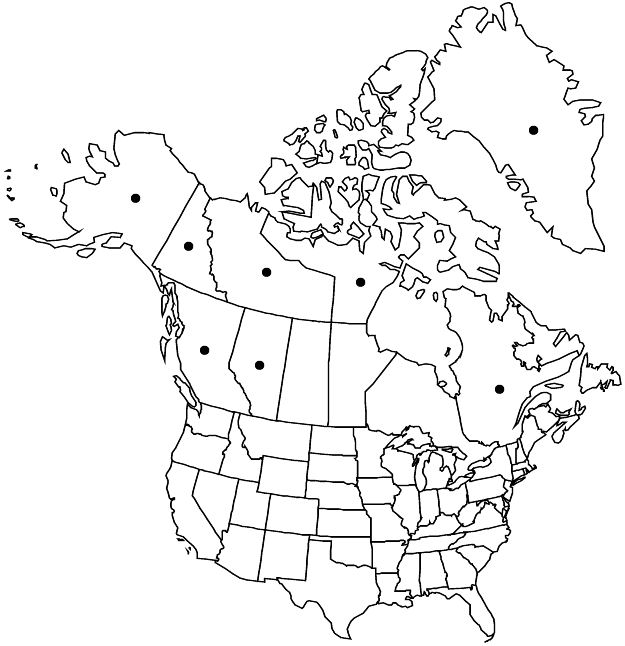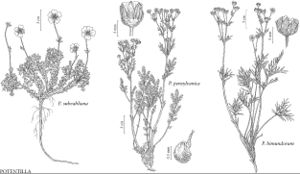Potentilla subvahliana
in A. I. Tolmatchew, Fl. Arct. URSS 9(1): 319. 1984.
Plants usually cushion-forming. Caudex branches stout, columnar, sheathed with marcescent whole leaves. Stems erect, 0.2–0.6 (–1.1) dm, lengths 2–4 times basal leaves. Basal leaves 0.5–2.5 (–3) cm; petiole 0.3–1.5 (–2) cm, long hairs common to abundant, spreading to ascending, 1 (–2) mm, ± weak, rarely stiff, smooth, crisped/short-cottony hairs usually absent, sometimes sparse, glands sparse to common; leaflets separate to slightly overlapping, central obovate, 0.5–1.2 (–1.5) × 0.4–0.9 (–1) cm, subsessile to short-petiolulate, base cuneate, margins revolute, distal 1/2 incised 1/2–3/4 to midvein, teeth (1–) 2–3 (–4) per side, ± distant, surfaces ± dissimilar, abaxial grayish or yellowish white, long hairs 0.5–1 mm, cottony-crisped hairs ± dense (often obscured by long hairs), adaxial dark green to greenish gray, long hairs ± abundant, other hairs absent. Cauline leaves (0–) 1 (–2). Inflorescences 1 (–2) -flowered. Pedicels 1–2 (–3) cm in flower, to 5.5 cm in fruit. Flowers: epicalyx bractlets lanceolate to elliptic-ovate, rarely linear, 3–6 (–7) × 0.8–2 (–2.3) mm, (1/2–) 2/3 to nearly as wide as sepals, margins flat or ± revolute, red-glands absent; hypanthium 2.5–4 mm diam.; sepals 3–5 (–6) mm, apex obtuse to subacute; petals 4–8 (–9) × 4–9 mm, longer than sepals; filaments 1–1.3 mm, anthers 0.3–0.5 mm; carpels 25–35, apical hairs absent, styles conic-columnar, ± papillate-swollen on less than proximal 1/5, 0.9–1.1 mm. Achenes 1.2–1.6 mm. 2n = 28 (Russian Far East).
Phenology: Flowering late spring to summer.
Habitat: Rocky alpine heaths, rock outcrops and crevices, scree and talus, dry tundra, coastal bluffs, stabilized sand dunes, usually on calcareous bedrock
Elevation: 0–1700 m
Distribution

Greenland, Alta., B.C., N.W.T., Nunavut, Que., Yukon, Alaska, e Asia (Russian Far East)
Discussion
The major part of the range assigned to Potentilla vahliana by E. Hultén (1968) belongs to P. subvahliana.
Two morphologic types are present within what is accepted here as Potentilla subvahliana. Plants corresponding to the type of P. subvahliana (Wrangel Island) are widespread throughout northeastern Asia (Chukotka) and arctic North America to northwestern Greenland. Some plants in alpine Alaska, Yukon, and east to Amundsen Gulf, Nunavut, are redder, more densely columnar, and less hairy, with smaller leaves having fewer and narrower lobes, more slender one-flowered stems, narrow and entire bracts, narrower sepals, and much narrower epicalyx bractlets. Potentilla subvahliana is tetraploid, perhaps an allopolyploid, and could consist of lineages from different parental combinations.
Selected References
None.
Lower Taxa
"thin" is not a number."dm" is not declared as a valid unit of measurement for this property."-4timesbasalleaves" is not declared as a valid unit of measurement for this property."dm" is not declared as a valid unit of measurement for this property."dm" is not declared as a valid unit of measurement for this property.
